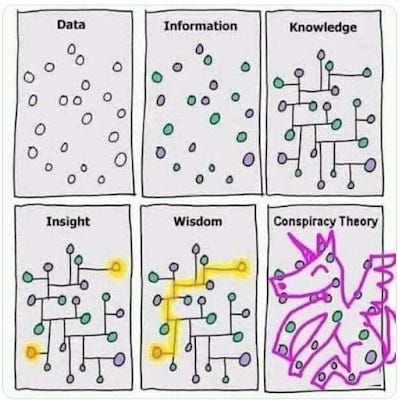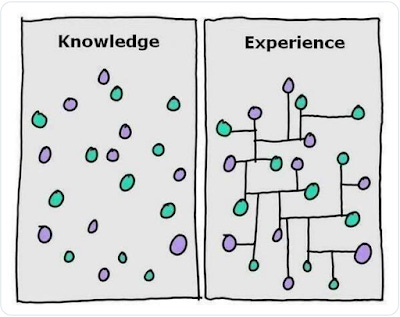Information, theory, smartness, and wisdom
This is a fantastic visualisation that draws the distinction between data, information, knowledge, theoretical insights (smartness), wisdom (experience), and conspiracy theories.
This visualisation links knowledge and experience.
The dots represent distinct and stand-alone packets of theoretical knowledge. The theory will also inform how some connections can be formed among the packets. But any kind of applied knowledge requires that theory be overlaid on real-world examples to generate practical insights. These insights that emerge from real-world examples (or experiences) aggregate to form the basis of human judgement. The ability to exercise good judgement is wisdom.
I have blogged here explaining my simple theory of comprehending the world. All comprehension is a combination of learnt knowledge and experiential knowledge (which comes from lived career and lived life). In this framework, the possession of learnt knowledge is a sign of being smart, whereas the possession of both learnt and experiential knowledge confers one with wisdom and the ability to exercise good judgment.
The smart person uses certain analytical frameworks to apply his/her vast knowledge and theoretical insights into drawing evidence-based inferences and making 'objective' recommendations. The wise person adds the layer of experience to distil knowledge and theory to exercise good judgement and take decisions. A point to note is that experience by itself does not necessarily (or most often) does not translate into an ability to make good judgement and (thereby) wisdom.
On closely related notes, I have blogged earlier on the importance of experience, "smartness" dominance in development debates, the distinction between being smart and wise, the twin tyrannies of quantitative methods and expert wisdom, the challenge of marrying experiential and evidentiary knowledge, the ideology of evidence-based policymaking, marginalisation of priors and elevation of evidence generation in policy-making, and the trend of ahistoricism and data analytics in economics.



